Rio base: Big mistake for England?
- Published
The BBC's Wyre Davies takes a tour of the training grounds where England will be based during the World Cup
For what it's worth, I think the England football team may have made a pretty big mistake by choosing Rio de Janeiro as their World Cup base - more specifically the particular part of Rio where they're hoping to spend most of the next month.
Initially, you can see the sense behind the choice of what some locals here know as the "cidade maravilhosa" - the "marvellous city".
Not wanting to be isolated in a plush resort, away from fans and "civilization", the England management listened to players' concerns about boredom and sought out a city centre location.
It was a policy that, after all, suited the England team well in the 2012 European Championships when they chose the Polish city of Krakow as their base.
But Rio is different.
'Luxury' hotel
When in the city briefly last year for a friendly fixture against Brazil, England stayed in a hotel right on Copacabana beach, in the heart of the hotel zone, close to the big tourist attractions and the temptations of Rio's famous night life.
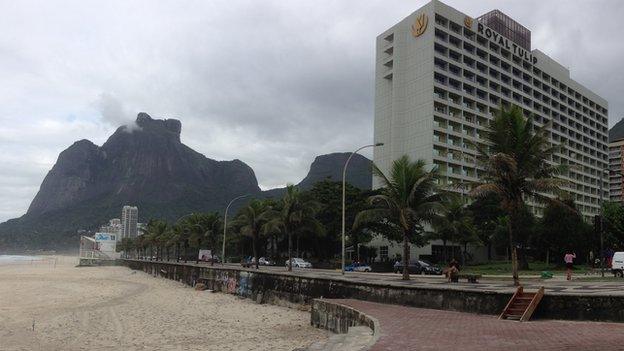
The Royal Tulip Hotel has been spruced up ahead of England's arrival
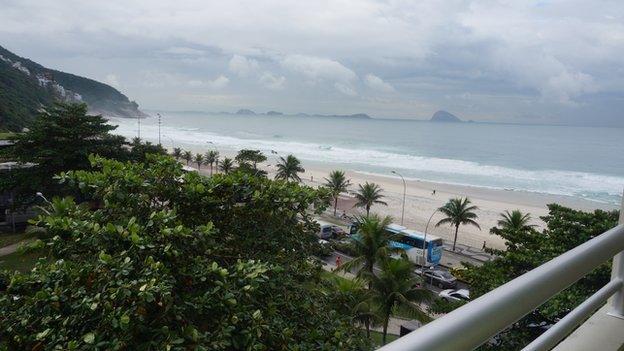
Views from the hotel are simply breathtaking
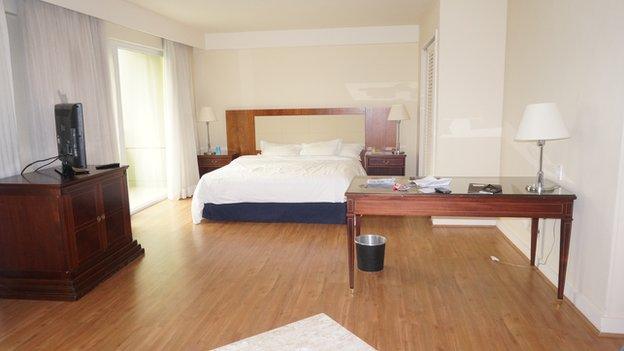
The rooms are pleasant but the decor and furnishings are rough around the edges
But for the World Cup, that stretch of beach on Copacabana is exactly where Fifa's fan fest is belatedly being built - a huge cavernous beer tent and big screen where hundreds of thousands of football fans, without tickets for the stadiums, will watch the matches.
You can see why England officials wanted to move away.
But move away they have, to a beach area well to the south of the city, known as Sao Conrado. From a distance, it looks pleasant enough, and there are the facilities of the upmarket Gavea Golf Club to which the players will, presumably, have access.
Apart from that, Sao Conrado has very little going for it.
England's chosen hotel, the Royal Tulip, is nice enough and has been spruced up ahead of the team's arrival.
Its billing as a "luxury" hotel is pushing things a bit. The rooms are pleasant but the decor and furnishings are rough around the edges and multi-million pound footballers will be used to a much classier standard of accommodation.
Upsurge in violence
The biggest problem is that, golf apart, there is absolutely nothing to do or see in the vicinity of the team hotel.
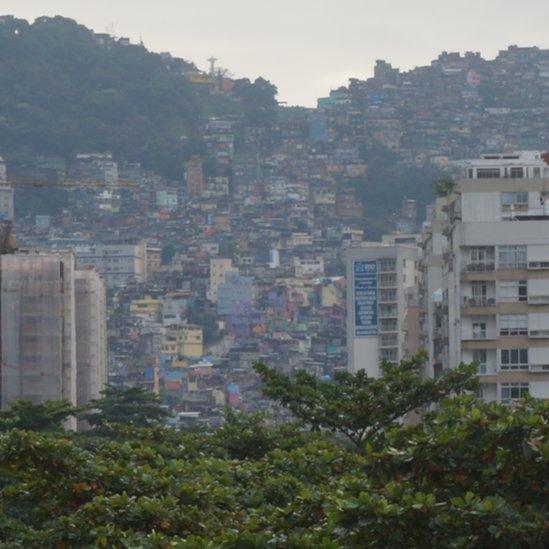
Rocinha favela has become something of a tourist attraction in recent years
The beach immediately in front is, arguably, the most polluted in the whole of Rio. It's not so much the rubbish that gets washed up on the sandy shore as the tonnes of untreated sewage that pour into the sea from the nearby Rocinha favela or shanty town.
Rocinha is Rio's biggest favela and, like some of the city's other "pacified" shanty towns, has become something of a tourist attraction in recent years.
Spread out along the hillside above Sao Conrado, Rocinha will be an unmissable sight as the England players relax on their bedroom balconies.
But, apart from the odd choreographed goodwill visit, English players are very unlikely to be venturing into the favela.
In recent weeks Rocinha - and several other favelas in Rio - have seen a worrying upsurge in violence between the resurgent drugs gangs and armed police.
There has been clearly audible gunfire from inside the community and people have been killed, either deliberately or in the crossfire.
Recently interviewed by the BBC, the police commander in Rocinha said that despite the troubles the England players had no need to worry because "what happens in Rocinha stays in Rocinha".
Different reality
If, as they wake up in the morning, England players stand on their balconies and their gaze wanders from the hillside to the street, they'll perhaps be mesmerised by the endless river of traffic that flows each morning in the direction of the city centre.
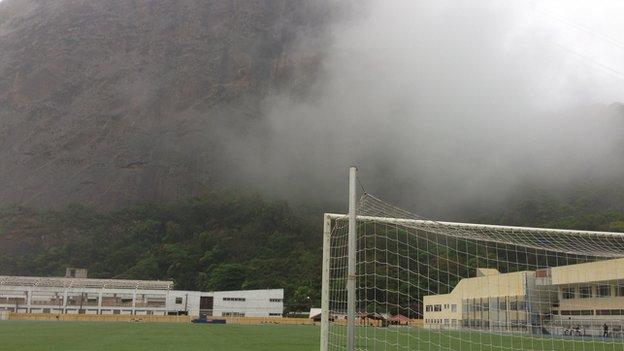
English players will be training on a secure military base, away from the prying eyes of the public and press
Like many other big cities, Rio has a chronic traffic problem. Public transport is completely inadequate and there is a heavy reliance on cars.
Commuters from Sao Conrado and Barra even further to the south can spend hours in the morning crawl to their jobs in central Rio.
That's in the same direction as England's daily training camp.
One assumes the team bus will be leaving each day after rush hour is over and returning before it begins. They'll also have a noisy, over-the-top police escort but the journey to the camp in the Rio suburb of Urca is unlikely to be traffic free.
Once in Urca, though, team England will have few complaints. Underneath the imposing Sugar Loaf mountain, it is one of Rio's most attractive areas.
They'll be training on a secure military base, away from the prying eyes of the public and press - something the England team management has always seen as a priority.
The FA has paid great attention to detail to help upgrade facilities at the base, which also serves as an army physical training centre in Rio.
The football pitch has been re-laid, gym facilities upgraded and there's even a (cleaner) private beach on which to unwind and to up the tans of those sun-starved English bodies.
The training camp aside, England have been lured by Rio's beguiling reputation - but the reality will be rather different.
Petty crime is rising alarmingly, so watches, expensive jewellery and designer clothing will have to be left behind in the hotel.
If wives and girlfriends come along, Rio has surprisingly few high-end shopping attractions (compared, say, with the much more modern metropolis of Sao Paulo) and all the beaches are public. There is always the military base where the players are training, but that might be a distraction too far.
How long team England stays in Rio depends entirely on how they fare in their group - and remember those group games will take them away from the delights of Sao Conrado from time to time.
Other teams have chosen much more suitable and diverse places to be based from Iguacu to Salvador to Belo Horizonte.
It would have been great had the England made the most of this huge country and realised there is so much more to it than Rio.
- Attribution
- Published24 May 2014
- Published28 May 2014
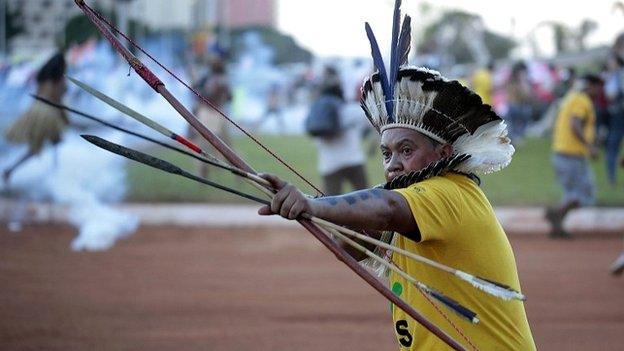
- Published6 May 2014
- Published30 May 2014
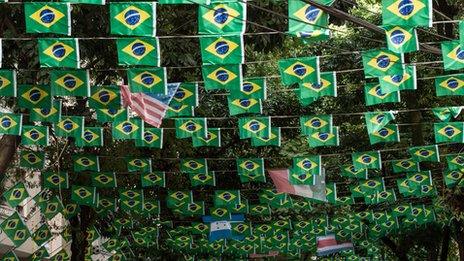
- Published13 April 2016

- Published1 May 2014
